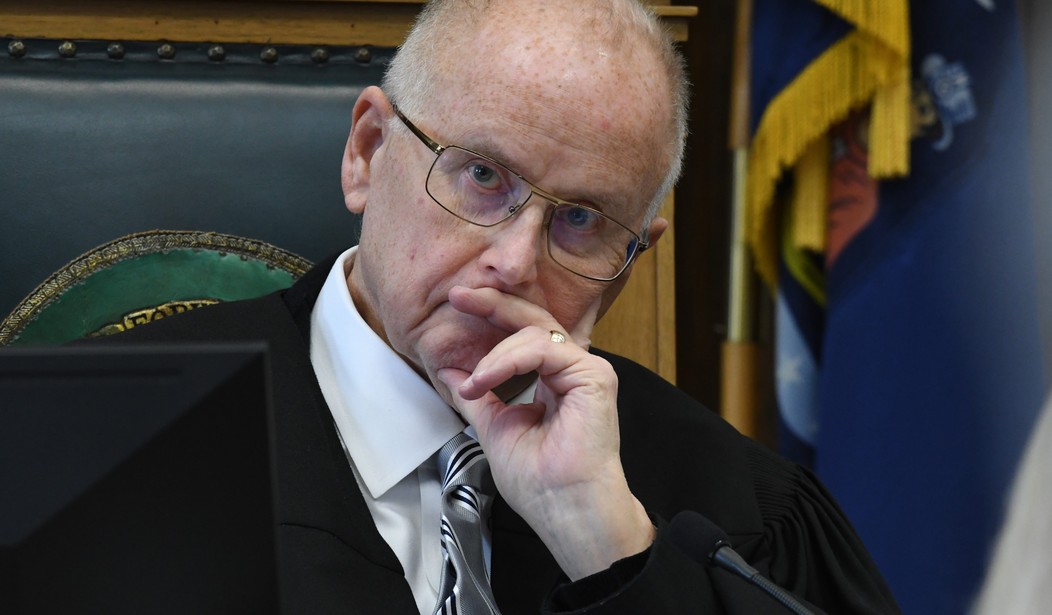Good question. In fact, as the Chicago Tribune points out, defense attorneys for Kyle Rittenhouse accused prosecutors of two separate acts of misconduct — one that made a splash in the courtroom, and one that pointedly did not. Both give reason for Judge Bruce Schroeder to declare a mistrial with prejudice, according to the defense brief … but Schroeder has yet to rule on either.
Why?
As Kyle Rittenhouse’s jury officially began its deliberations Tuesday, a piece of unfinished business still hung over the case.
The defense filed a motion ahead of Monday’s closing arguments asking for a mistrial based on prosecutorial misconduct. The request will be moot if the jury — which began deliberations at 9:15 a.m. local time — acquits Rittenhouse of the five felony charges against him, so it appears the judge will not address the issue until after deliberations.
Eighteen jurors listened to the case, though only 12 have been tapped to reach a verdict. Before deliberations began, Rittenhouse on Tuesday pulled six numbers from an old-fashioned lottery tumbler that is original to the 100-year-old courtroom, and those six people were designated as alternates. …
The mistrial motion rehashes an issue that arose last week when the judge berated an assistant district attorney for ignoring a pretrial order that barred the jury from hearing certain evidence and for infringing on Rittenhouse’s right to remain silent upon his arrest. It also levels a new accusation at prosecutors, accusing them of not properly sharing a piece of video evidence.
The line of questioning from ADA Thomas Binger was such a blatant constitutional violation that it resulted in a ferocious rebuke from Schroeder when it occurred. Binger accused Rittenhouse of hiding his guilt by remaining silent long enough to wait and see what testimony others would give and then tailoring his own testimony around it. Constitutionally, prosecutors are barred from arguing that silence indicates guilt, a legal tradition that goes back to our founding. That alone would constitute grounds for an appellate court to throw out any potential convictions in this case.
If the defense is accurate in claiming that the prosecution withheld video evidence, that would also create not just reversible error but also establish a separate kind of prosecutorial misconduct. The first error only would have impacted this jury, but a discovery violation of significant magnitude suggests a corrupt prosecution. That could justify the kind of sanction sought in this motion — a mistrial that includes a bar on ever filing these charges or any others related to this incident again.
The mystery here isn’t so much whether prosecutors committed these violations; Binger clearly committed the first in public view, and their rushed effort to insert a provocation argument at the last minute may have created a discovery issue as well. The mystery is why Schroeder hasn’t ruled on it yet, in one direction or the other:
As of Tuesday morning, Judge Bruce Schroeder had not issued a ruling.
If the jury comes back and acquits Rittenhouse in the fatal shooting of two people and the wounding of a third, the motion is moot.
But if the jury returns a conviction on any count, Schroeder will need to make a ruling.
Given those dynamics, legal experts told the Journal Sentinel it was somewhat unusual that Schroeder had not yet issued a ruling on the motion.
“I’m not sure why the judge has waited to rule,” said Michael O’Hear, professor of criminal law at Marquette Law School, in a email. “It seems unlikely to me that he would have turned the case over to the jury if he expected to grant the mistrial.”
Not so fast, another legal observer told the Detroit Free Press:
Keith Findley, a professor at the University of Wisconsin Law School, called the lack of decision “odd.”
“The only reason I can think of for waiting is perhaps he wants to give the jury a chance to acquit so he doesn’t have to, but that’s speculation on my part,” Findley, co-founder of the Wisconsin Innocence Project, said in an interview.
That is the only reason that makes sense. If this motion was meritless, Schroeder could easily have denied it up front, which would still have established both issues for appellate review. Unless Schroeder has quietly dispensed of the motion already, he may have decided to hold it as a means to let the jury make the decision for themselves. Judges have the authority to set aside jury verdicts for conviction if the judge finds it to be unjust or the case unproven. Schroeder has given all indications that he wants the jury to decide most of the issues in this case rather than himself, or at least to have been given the opportunity to do so responsibly.
Given the political context in which this trial takes place, who could blame Schroeder for that strategy? Taking this out of the hands of the jury would have prompted the kind of social unrest that created the circumstances that led to this case. Even an egregious constitutional error such as that committed by Binger wouldn’t have lessened the response to a mistrial-with-prejudice declaration. Of course, a mistrial declaration after a jury conviction might arguably be worse in those terms, but Schroeder would have given the process every opportunity to work properly first.
The jury remains in deliberations as this post is written. The longer the jury stays out, the less likely that a full acquittal on self-defense seems. Perhaps the best fallback position for Schroeder at that point would be a hung jury, at which point he can close down the show entirely with the defense motion. Stay tuned.








Join the conversation as a VIP Member